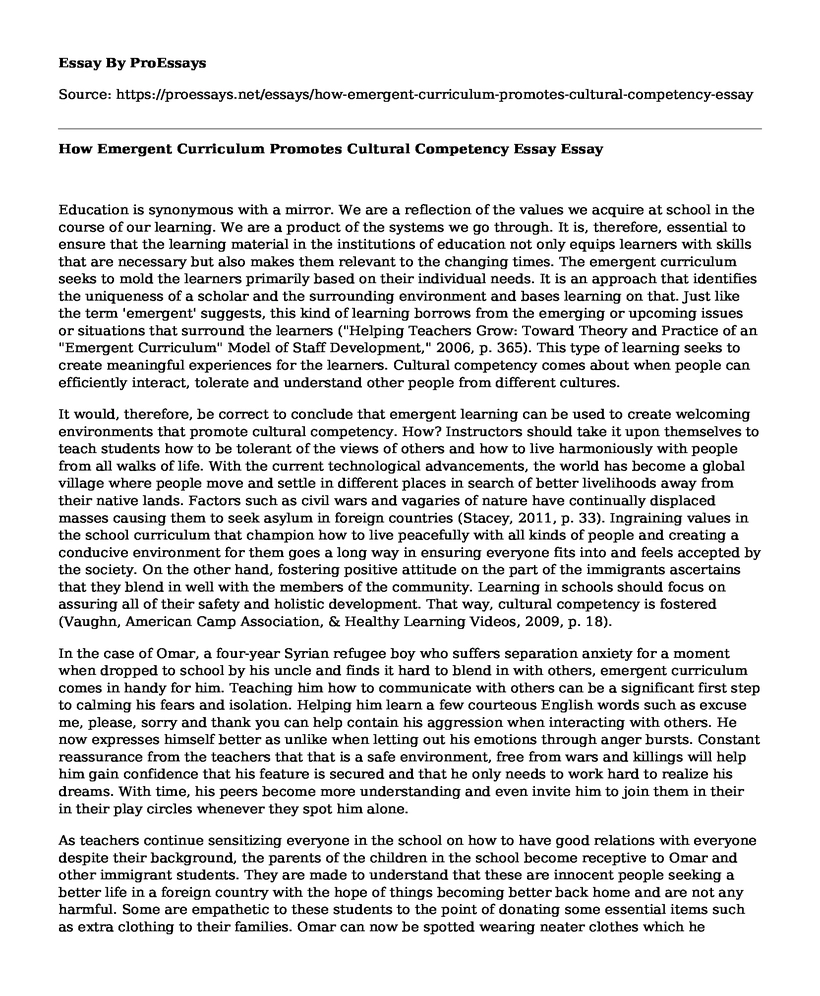Education is synonymous with a mirror. We are a reflection of the values we acquire at school in the course of our learning. We are a product of the systems we go through. It is, therefore, essential to ensure that the learning material in the institutions of education not only equips learners with skills that are necessary but also makes them relevant to the changing times. The emergent curriculum seeks to mold the learners primarily based on their individual needs. It is an approach that identifies the uniqueness of a scholar and the surrounding environment and bases learning on that. Just like the term 'emergent' suggests, this kind of learning borrows from the emerging or upcoming issues or situations that surround the learners ("Helping Teachers Grow: Toward Theory and Practice of an "Emergent Curriculum" Model of Staff Development," 2006, p. 365). This type of learning seeks to create meaningful experiences for the learners. Cultural competency comes about when people can efficiently interact, tolerate and understand other people from different cultures.
It would, therefore, be correct to conclude that emergent learning can be used to create welcoming environments that promote cultural competency. How? Instructors should take it upon themselves to teach students how to be tolerant of the views of others and how to live harmoniously with people from all walks of life. With the current technological advancements, the world has become a global village where people move and settle in different places in search of better livelihoods away from their native lands. Factors such as civil wars and vagaries of nature have continually displaced masses causing them to seek asylum in foreign countries (Stacey, 2011, p. 33). Ingraining values in the school curriculum that champion how to live peacefully with all kinds of people and creating a conducive environment for them goes a long way in ensuring everyone fits into and feels accepted by the society. On the other hand, fostering positive attitude on the part of the immigrants ascertains that they blend in well with the members of the community. Learning in schools should focus on assuring all of their safety and holistic development. That way, cultural competency is fostered (Vaughn, American Camp Association, & Healthy Learning Videos, 2009, p. 18).
In the case of Omar, a four-year Syrian refugee boy who suffers separation anxiety for a moment when dropped to school by his uncle and finds it hard to blend in with others, emergent curriculum comes in handy for him. Teaching him how to communicate with others can be a significant first step to calming his fears and isolation. Helping him learn a few courteous English words such as excuse me, please, sorry and thank you can help contain his aggression when interacting with others. He now expresses himself better as unlike when letting out his emotions through anger bursts. Constant reassurance from the teachers that that is a safe environment, free from wars and killings will help him gain confidence that his feature is secured and that he only needs to work hard to realize his dreams. With time, his peers become more understanding and even invite him to join them in their in their play circles whenever they spot him alone.
As teachers continue sensitizing everyone in the school on how to have good relations with everyone despite their background, the parents of the children in the school become receptive to Omar and other immigrant students. They are made to understand that these are innocent people seeking a better life in a foreign country with the hope of things becoming better back home and are not any harmful. Some are empathetic to these students to the point of donating some essential items such as extra clothing to their families. Omar can now be spotted wearing neater clothes which he changes more often. He also shares and smiles more often and has made more friends. He even says that he wants to be a doctor when he grows up and go back to Syria and treat the casualties of the civil unrest. Omar is slowly embracing the world surrounding him and becoming better, shedding the fear of being in a new environment and can begin to live life again.
References
Helping Teachers Grow: Toward Theory and Practice of an "Emergent Curriculum" Model of Staff Development. (2006). Early Childhood Education Journal, 33(5), 363-370.
Stacey, S. (2011). The Unscripted Classroom: Emergent Curriculum in Action. New York: Redleaf Press.
Vaughn, G., American Camp Association, & Healthy Learning Videos. (2009). Cultural competency: Understanding total diversity.
Cite this page
How Emergent Curriculum Promotes Cultural Competency Essay. (2022, May 15). Retrieved from https://proessays.net/essays/how-emergent-curriculum-promotes-cultural-competency-essay
If you are the original author of this essay and no longer wish to have it published on the ProEssays website, please click below to request its removal:
- Terrorist Attack on the Eagles of Death Metal Concert
- Personal Statement on Supply Chain and Operational Management
- The Effects of Teaching Hearing Infants Sign Language Essay
- Dissertation on Tunisian Cultural Identity in Cinema After the Rise of the Arab Spring's Protest
- Essay Sample on Nutrition in Childcare
- Essay Sample on Classroom Environment: Impact on Early Cognitive Development in 3-7 Year-Olds
- Human Behavior for Risk Management - Report Example







